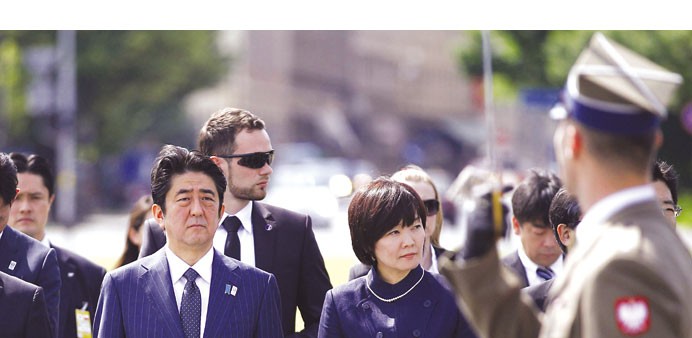Japan’s Prime Minister Shinzo Abe and his wife Akie view the guard of honour following a wreath laying ceremony at the Tomb of the Unknown Soldier in Warsaw yesterday.
AFP/Warsaw
Japanese Prime Minister Shinzo Abe made a push yesterday for his country’s nuclear technologies at a summit in Warsaw with leaders of four ex-Communist European countries, as part of his bid to boost the Asian powerhouse’s exports.
Abe recently unveiled plans to treble Japan’s infrastructure exports to 30tn yen ($300bn) a year, a target that could not be reached without nuclear reactors.
At Japan’s first summit with the so-called Visegrad Group—the Czech Republic, Hungary, Poland and Slovakia—Abe sought to interest the four in Japanese nuclear technology.
“We stressed the necessity of strengthening co-operation, especially in the area of energy policy,” said Abe after the meeting.
A joint statement issued following the talks said Japan welcomed the fact that “private sectors of both sides demonstrated keen interest in concrete forms of co-operation in nuclear energy and safety”.
Nuclear power has become a sensitive issue in Japan after the Fukushima Daiichi plant went into meltdown in 2011. Reactors spewed radiation over a wide area, after a 9.0-magnitude earthquake triggered a massive tsunami.
In the wake of the disaster, Japan turned off its 50 reactors for safety checks but has restarted two of them, saying it needs to head off possible summertime power shortages.
Despite vocal public opposition, Abe has said he wants to restart other units when they are proven safe.
In his first visit to Europe since taking office in December, promoting his country’s nuclear technologies was high on the agenda.
Mariusz Dabrowski, a Japan specialist at the Poland-Asia Research Centre, told AFP: “Now whenever Prime Minister Abe shows up abroad, it’s Japanese nuclear technology that he promotes.”
At talks yesterday ahead of the Visegrad summit, Abe and Polish Prime Minister Donald Tusk agreed to hold further talks on nuclear power and renewable energy.
Warsaw is planning to build its first nuclear facility by 2024, while the neighbouring Czech Republic has plans to expand its Soviet-designed Temelin plant.
Both are multi billion dollar contracts for which Japanese companies have bid.
Poland, which currently relies on its vast coal reserves to produce about 90% of its electricity, is scrambling to find alternative energy sources—including nuclear and shale gas—in order to meet European Union greenhouse gas emission limits by 2020.
Describing Poland as “an engine of economic growth in Europe”, Abe said he and Tusk also discussed boosting bilateral trade.
Japan-Poland trade reached an estimated €3bn in 2011, according to latest Polish government data.
Japanese exports to Poland, which are dominated by cars, LCD monitors and electronics, accounted for 2.6bn of the total.
Car engines, pork and pork products, jet engines and razors topped Polish exports to Japan.
Abe also noted the potential for trade with the four Visegrad countries, a market of 64mn consumers.
Following his visit to Warsaw, the Japanese prime minister is to head to Northern Ireland where he would attend the G8 summit, which opens today.

